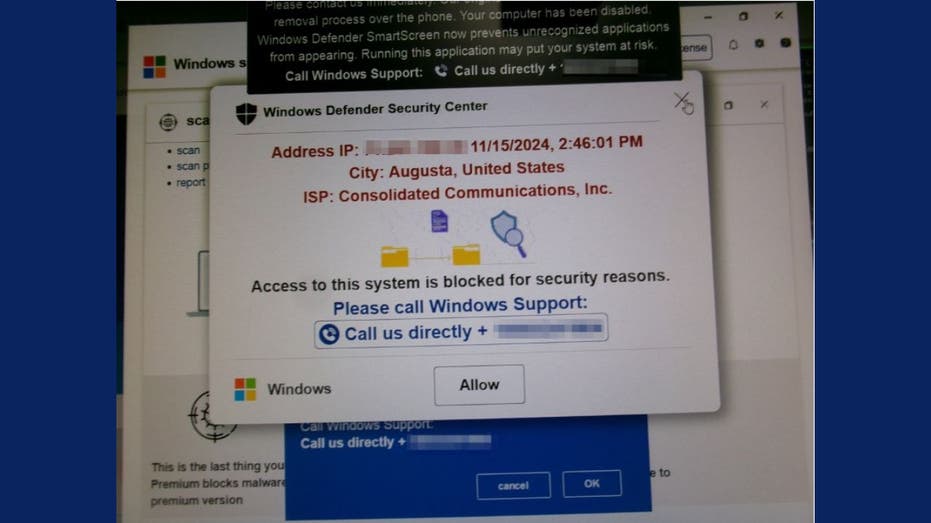- by foxnews
- 17 Mar 2025
Windows Defender Security Center scam: How to protect your computer from fake pop-ups
Tech expert Kurt "CyberGuy" Knutsson says a tech support scam used a fake Windows Defender pop-up, tricking the victim to call and download software.
- by foxnews
- 31 Dec 2024
- in technology

In an email we received from Janet D., she shared her recent unsettling experience. Here's what she described:
"I received a pop-up that froze my computer and read, 'Access to this system is blocked for security reasons' from Windows Defender Security Center. It came with an audio message and siren."
Janet did what many might do in such a panic-inducing situation: She called the number displayed on her screen. She was instructed to press Ctrl + Shift + Esc, unfreezing her computer, but the instructions didn't stop there. The scammer directed her to download software from UltraViewer.net, a legitimate remote access tool often exploited by bad actors. Here's what you should know if you ever encounter a similar scam.
1) Unsolicited pop-ups claiming to be from Microsoft or other security services: Janet's story highlights a common scam tactic, which is fake alerts masquerading as official warnings. Microsoft and other legitimate companies do not issue pop-ups with support numbers or direct you to download remote access software.
2) Urgent audio and visual cues: Scammers create a sense of urgency with sirens, flashing messages and warnings of dire consequences to push victims into immediate action without thinking critically.
3) Requests to install remote access software: Scammers often use tools like UltraViewer, TeamViewer or AnyDesk to gain access to victims' systems. While these tools are legitimate for remote tech support, downloading them at the request of an unknown party is a red flag.
If you come across a scam, it's important to act quickly and take the following steps to protect yourself and your information.
If you receive a suspicious pop-up, do not call the number provided or follow any on-screen instructions. Look up any suspicious phone numbers or messages independently. Use Ctrl + Alt + Del to open the Task Manager and close the browser or application displaying the message.
Scammers thrive on urgency. Take a moment to assess the situation calmly. Janet asked if the scammers could have taken any information. Here's what to do.
Janet also mentioned that her antivirus software didn't flag the scam. Unfortunately, many of these scams rely on social engineering rather than malware to bypass antivirus detection. They exploit human psychology, not just technical vulnerabilities. However, running regular scans can still help detect hidden threats.
First, don't be the slightest bit embarrassed, as it could have happened to genuinely anyone. And the worst thing you can do is stay silent. You can help prevent this from happening to others.
Stop all communication: Cease all contact with the scammer immediately. Do not engage further or respond to any messages or calls from them.
Report the scam: Report the incident to your local law enforcement agency or the cybercrime unit in your country. Provide them with all the information you have about the scammer and the communication you had with them.
Notify your bank and credit card companies: If you shared any financial information, contact your bank and credit card companies right away. Inform them about the potential scam and ask for advice on how to secure your accounts.
Monitor your accounts: Keep a close eye on your bank accounts, credit cards and other financial accounts for any suspicious activity. Report any unauthorized transactions immediately.
Inform credit bureaus: Consider contacting credit reporting agencies to put a fraud alert on your credit report. This can help prevent the scammer from opening new accounts in your name.
Be cautious about future communications: Be vigilant regarding any future communications from unknown sources. Scammers may try to target you again using different tactics.
Janet's experience is a reminder that even the most vigilant among us can fall prey to clever scams designed to exploit fear and urgency. By recognizing red flags like unsolicited pop-ups, high-pressure tactics and requests for remote access, you can protect yourself and your personal information. If you ever encounter a situation like Janet's, remember to stay calm, verify the legitimacy of any alerts and take the necessary steps to secure your system. Scammers rely on quick reactions, so slow down, stay in control and don't let them manipulate your next move.
Follow Kurt on his social channels:
Answers to the most asked CyberGuy questions:
New from Kurt:
Copyright 2024 CyberGuy.com. All rights reserved.
- by travelandtourworld
- descember 09, 2016
Air Astana Group Reports Strong Growth in First Year as Public Company, Expands Network and Fleet
Kazakhstan’s leading airline group, Air Astana, has successfully completed its first year as a publicly traded company, achieving a 12.4% increase in revenue, 14.9% rise in operating profit, and a passenger surge to nine million—an 11.2% jump from 2023.
read more





